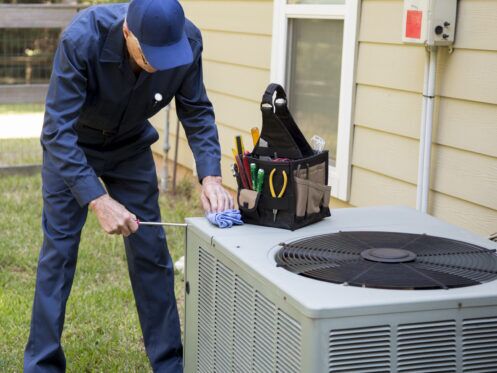Stay warm this winter with expert furnace repair services.
Stay warm this winter with expert furnace repair services.
Blog Article
The Ultimate Overview to Troubleshooting Common A/c and Air Conditioning Problems
Home owners typically encounter numerous issues, from insufficient cooling to complicated sounds emanating from their devices. Recognizing when an issue exceeds standard solutions can be similarly essential.
Common Cooling And Heating Issues
Recognizing usual HVAC troubles is important for keeping a comfy indoor atmosphere. Homeowners usually encounter issues that can interfere with heating, ventilation, and air conditioning systems.
One more frequent issue is refrigerant leaks, which jeopardize the effectiveness of a/c systems. Insufficient cooling agent levels can cause systems to have a hard time in cooling spaces, bring about higher operational costs and prospective lasting damage. In addition, thermostat malfunctions can cause improper temperature level policy, causing pain and extreme energy use.
Attending to these issues without delay is vital to stop additional damages and ensure ideal system efficiency. Normal upkeep and prompt medical diagnosis of these typical HVAC issues can considerably enhance the integrity and performance of heating and cooling systems, ultimately adding to a more comfortable living environment. HVAC Farmington MO.

Indicators of A/c Problems
Identifying the indications of cooling problems is crucial for making sure optimal efficiency and convenience in your house. Among one of the most instant indicators is not enough cooling; if your a/c device is not supplying the anticipated degree of air conditioning, it can symbolize reduced cooling agent degrees, a falling short compressor, or clogged filters. Additionally, if you discover unusual sounds-- such as grinding, squealing, or rattling-- this might indicate mechanical troubles that require prompt focus.
Another important indication is a boost in power bills without an equivalent adjustment in use. This inadequacy frequently points to underlying problems, such as dirt accumulation in the coils or ductwork leaks. Additionally, if you identify undesirable odors emanating from the system, it could be a sign of mold development or electrical problems, both of which require immediate analysis.
Lastly, frequent biking on and off, known as short-cycling, can indicate problems with the thermostat or an improperly sized unit. By being cautious concerning these indications, you can address air conditioner issues early, making sure a comfy atmosphere and lengthening the life of your air conditioning system.
Step-by-Step Troubleshooting
When your air conditioning system begins to underperform, it's vital to damage down the repairing procedure into workable actions. If the setups are right, check the air filter; a filthy or blocked filter can dramatically restrain air flow and effectiveness.
Next, check out the breaker or fuse box for stumbled breakers or blown merges. If the breaker has actually tripped, reset it, however watch on it; if it journeys again, there may be a much deeper electric concern.
Evaluate the outdoor unit for particles, such as fallen leaves or dirt, which can block air flow. Make sure the device is clear and that the fins are not bent.
Preventive Upkeep Tips

During these assessments, specialists can identify and deal click to find out more with prospective issues prior to they intensify. In addition, replace air filters every 1-3 months to enhance air quality and system effectiveness.
Keep the outside unit free from debris, such as leaves and dust, which can prevent air movement. Trim bordering greenery to preserve a minimum of two feet of clearance (furnace repair). Examine and cleanse the condensate drain to avoid water damage and mold and mildew development
Evaluate insulation around air ducts, guaranteeing it remains intact to avoid power loss. Think about a programmable thermostat to optimize power use according to your timetable.
Lastly, check your system's efficiency routinely, keeping in mind any uncommon sounds or modifications in temperature. Proactive steps are crucial in preserving an effective HVAC system, inevitably resulting in reduced energy costs and improved comfort.
When to Call a Professional
Knowing when to call an expert for HVAC concerns can save you time, cash, and unneeded stress. While some minor issues may be dealt with with DIY troubleshooting, specific indications show that expert intervention is required. If you experience inconsistent temperature levels throughout your home, uncommon sounds from your HVAC system, or relentless smells, it is important to look for expert aid.
Furthermore, if your device stops working to begin or frequently cycles on and off, these might be signs of more significant underlying concerns that need specialized knowledge and devices (hvac). Refrigerant leaks, electric breakdowns, or problems with the compressor can make complex repairs and might position safety and security dangers
Another critical element is the age of your system. If your HVAC system is over 10 years old and shows repetitive concerns, visit the site speaking with a professional for a complete examination can assist establish whether more information repair or substitute is more cost-efficient. Additionally, if you do not have the convenience or experience to handle complicated repair work, it's prudent to count on a qualified professional.
Inevitably, prioritizing safety and security and performance is extremely important. When unsure, err on the side of care and speak to a professional to guarantee your HVAC system operates optimally.
Conclusion
In final thought, efficiently troubleshooting usual A/c and Air conditioner concerns requires a systematic technique to determine issues, apply step-by-step options, and focus on precautionary upkeep. Recognizing signs of malfunction can avoid small problems from rising into considerable repairs.
Report this page